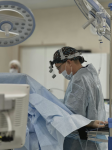
Changing careers can be super challenging, especially if you’re stepping into a completely different industry.
But if you’re looking for purpose and a career that truly makes a difference, nursing can offer all of that and more.
Within the next few years, the US is likely going to experience more shortages in nursing staff.
By 2033, America’s demand for registered nurses (RNs) will increase by 6 percent.
Hence, if you want to switch to nursing, now is the time.
With the right planning and mindset, it’s possible to make a fast and successful transition into the field of nursing.
Here’s how.
Why Does Nursing Attract Career Changers?
There’s a reason why so many people in their late 20s, 30s, and even 40s are leaving their established careers behind to become nurses.
Nursing is, after all, less of a job and more of a calling.
At the same time, it’s also one of the most flexible and future-proof professions out there.
Nurses work in hospitals, outpatient clinics, schools, corporate offices, research labs, and even on the road with travel assignments.
This level of versatility allows new entrants to shape their nursing careers around their interests and lifestyle preferences.
Moreover, nursing offers steady demand.
With an aging population and a growing need for healthcare services, the job market for nurses is strong.
Nurses also make good money in the US, with RNs having an average yearly income of $98,430.
However, many choose nursing as a second career because of the personal fulfillment of helping others that the career offers.
Choosing an Accelerated Program to Get There Faster
If you already hold a non-nursing bachelor’s degree, you don’t need to start college all over again.
Accelerated nursing programs are designed specifically for people like you– career changers who want to fast-track their entry into the nursing profession.
According to Elmhurst University, these programs condense the essentials of nursing education into a focused, intensive format.
Such a program typically lasts around 16 months.
ABSN online programs further allow students to complete much of their coursework remotely while working other jobs.
Students, however, can still participate in hands-on clinical rotations at partnered healthcare facilities.
These programs recognize the urgency many career changers feel.
Accelerated programs have become essential pathways in modern nursing education.
They offer new opportunities for passionate individuals to engage in nursing practice sooner than ever.
How Do You Prepare Yourself Mentally and Financially for a Switch to a Nursing Career?
While an accelerated nursing program might only take a year or two, don’t let the shorter timeline fool you.
These programs are rigorous and fast-paced, meaning they demand your full attention.
Balancing work and study during this time can be extremely difficult, so it’s wise to plan accordingly, both mentally and financially.
That might mean dipping into savings, securing loans, or cutting back on non-essential expenses during your education.
It’s also important to surround yourself with people who understand the commitment you’re making.
Friends and family who support your decision can make a huge difference, especially on the days when everything feels overwhelming.
Adjusting to a New Way of Learning
Transitioning into nursing from another career often requires a different learning style. In nursing, memorizing information isn’t enough.
You need to apply your knowledge in real-life situations that involve emotions, quick decision-making, and ethical judgment.
Clinicals help bridge that gap, offering opportunities to practice in a controlled environment before stepping into a hospital or healthcare setting.
Many career-changers are surprised by how emotionally intense nursing can be.
You’ll encounter people at their most vulnerable.
You’ll see life begin and end.
Some days will stretch your emotional resilience in ways your previous job never did.
But for many, that’s exactly what draws them in.
The depth of human connection in nursing is unparalleled, and it turns ordinary work into something much more meaningful.
What Comes After Graduating from a Nursing Program?
Once you’ve completed your accelerated program and passed the NCLEX-RN exam, the door opens to a world of possibilities.
You might start in a hospital setting on a medical-surgical floor, or in a specialized area like pediatrics or oncology.
Over time, you’ll be able to carve out your niche.
As a new nurse, be prepared for the steep learning curve in those first few months on the job.
Many hospitals offer nurse residency programs to help bridge the gap between school and practice.
These programs can make a huge difference in your confidence and performance.
Even if you feel like a beginner now, it won’t be long before you’re the one mentoring new grads and offering guidance.
Making a fast career change to nursing isn’t easy, but for the right person, it’s worth it.
It demands commitment, sacrifices, and a willingness to completely reinvent yourself.
But in exchange, it offers deep personal satisfaction and a chance to impact lives every single day.
This kind of leap isn’t just about finding a new job; it’s about finding your place.
And if that place involves caring for others, nursing might just be the career change you didn’t know you were waiting for.








